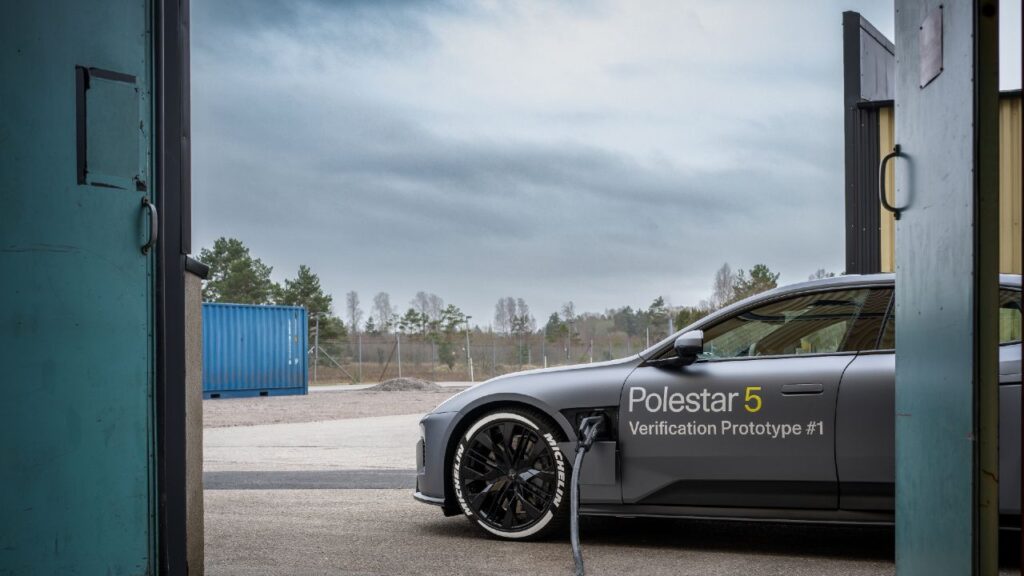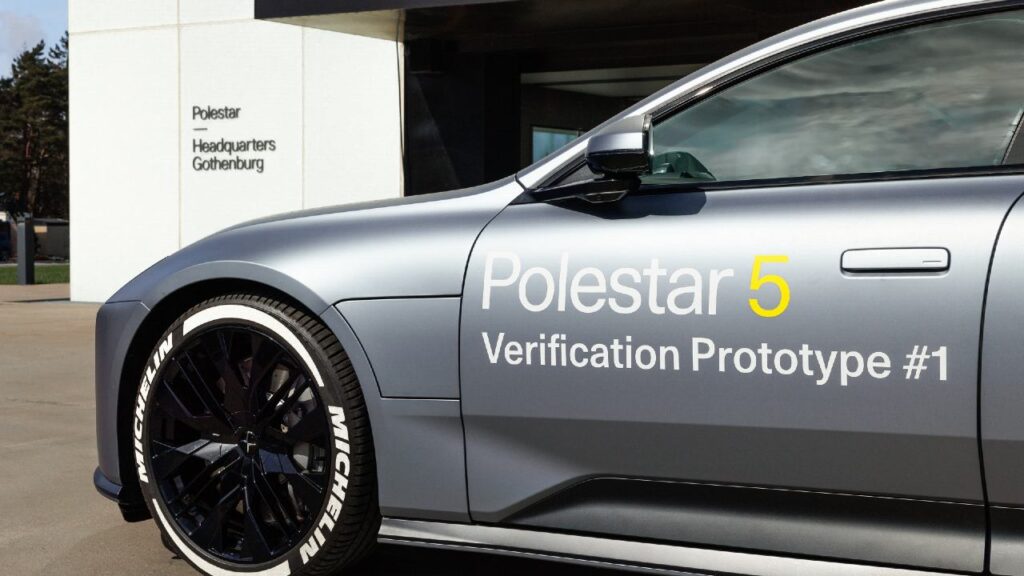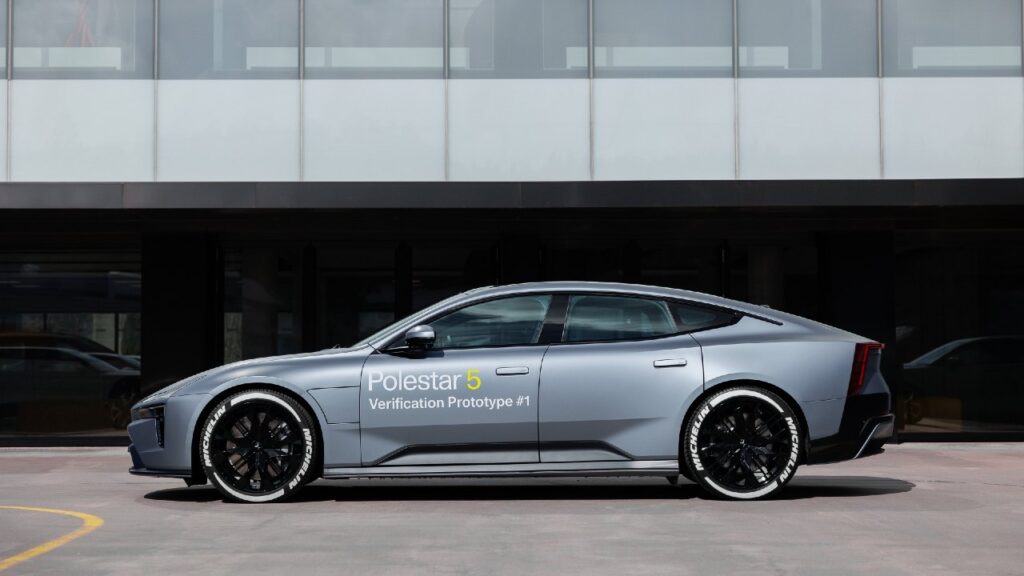Israeli tech company, StoreDot, has run a successful experiment of installing a 77 kWh battery in a drivable Polestar 5 prototype and charging it from 10% to 80% in 10 minutes.
StoreDot and Polestar have successfully completed an Extreme Fast Charging (XFC) experiment by achieving a 10-min charging time for 10% to 80%. The official press release confirms that the 77 kWh battery was charged at over 310 kW for the entire test procedure with the peak in excess of 370 kW. The silicon-dominant battery cells (300 Wh/kg) were installed in a fully drivable Polestar 5 prototype. All cell parameters including temperature, voltage and charged capacity were monitored throughout.

You might also like: Mazda and Panasonic To Work On Cylindrical Cells For EV Batteries
StoreDot and Polestar Achieve 10-Min Charging Tech
The new test showed that an electric car can now charge in just 10 minutes using special batteries with the use of silicon. This fast charging can make people less worried about running out of power and encourage more people to use electric cars. These new batteries with silicon can store more energy and charge faster than the ones with graphite, which are used in most batteries now. The ones with graphite are almost as good as they can get, but the ones with silicon still have room to improve in the future.
The company has chalked out a roadmap to production via its ‘100inX’ strategy. This represents 100 miles (161 km) of charge in X minutes. This X is 5 minutes for the 2024 production model (300 Wh/kg), 4 minutes for 2026 (340 Wh/kg), 3 minutes for 2028 (400 Wh/kg) and 2 minutes for 2032 (500 Wh/kg). Other upcoming milestones include shipping prismatic B-samples to OEMs and signing strategic manufacturing agreements.
You might also like: Top 3 Potential Alternatives To Lithium-Ion Batteries For EVs
CEOs’ Commentary
On this occasion, Dr. Doron Myersdorf, CEO of StoreDot said, “We are very excited to share this impressive achievement today and are proud to be on this journey with Polestar, a leading car brand who envisions high performance cars with a sustainable future. We’re happy to see our partner is among the first EV car makers to acknowledge that XFC is now a necessary standard to make vast EV adoption a reality. With our extreme fast charging technology, you can add 200 miles in under 10 minutes. This breakthrough revolutionizes EV ownership experience by eradicating the barrier of range and charging anxiety once and for all. Drivers can now truly travel long distances with the same freedom and convenience as traditional petrol-powered vehicles.”
Thomas Ingenlath, CEO of Polestar commented, “By eliminating charging times that were previously an obstacle, StoreDot’s XFC battery cells combined with our cutting-edge product development and battery engineering have unlocked new frontiers for electric mobility. This technology will reshape consumer expectations and accelerate mass EV adoption by making EV ownership a seamless experience for the mass market.”

You might also like: Lithium-Sulphur Batteries For EVs Promise 5-Min Charging Time
Learn Electric Cars Says
EV battery technology is experiencing rapid and exponential innovation. Extensive R&D is going on in this field from established legacy players, as well as new startups from all across the globe. That is the reason why we are witnessing new breakthroughs almost every week. While it might seem too complicated at the moment, I feel this is the only way to scout through the heaps of new options available in the future.
It is only natural that only a few robust companies will survive going forward. In any case, the potential EV owners stand to benefit from this large-scale innovation. We are observing some common signs to create the ideal EV battery solution for the future. Companies are experimenting with new cell chemistries, enhanced battery management systems, efficient cooling mechanisms, etc., to ensure low weight, high range, high energy density and fast charging rates. These are the most important factors when making EV batteries.
Achieving balance among these aspects is a tricky process, which will need a lot of innovation and investment. That is where the future lies. We shall keep an eye out for more such tech products in times to come. Also, let us see when this StoreDot battery makes it into the first production EV.


Pingback: Top 2 in 5 Used Electric Cars Come From Tesla, Industry Grows
Pingback: Polestar 2 and 3 Get Updates, 4 Undergoes Media Reviews
Pingback: Bobs SEO Reno
Pingback: arena breakout time2win
Pingback: pg333
Pingback: view it now
Pingback: โรงงานผลิตสายรัดพลาสติก
Pingback: Free Songs Download
Pingback: link
Pingback: try this
Pingback: แทงบอลยังไงให้ได้กำไร สูตรแทงบอลคู่คี่ สำหรับมือใหม่
Pingback: Diyala Science1
Pingback: ปั่นสล็อต อย่างไรให้โบนัสแตกบ่อย แจกจริง
Pingback: m358
Pingback: สีพ่นรถยนต์
Pingback: เว็บพนันออนไลน์เงินวอน
Pingback: โรงงานซักผ้า
Pingback: dark168
Pingback: Ricky Casino
Pingback: ชุดกระชับสัดส่วน
Pingback: Fulfillment
Pingback: Steinway
Pingback: 1win
Pingback: pinco indir
Pingback: pop over to these guys